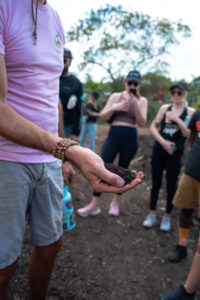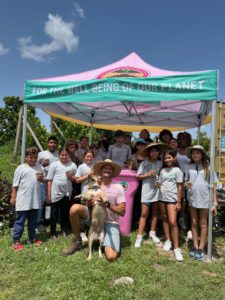From Scraps to Soil: How Compost for Life Hopes to Revolutionize Waste Management in Miami
Return to Newsletter Home Page with Latest Articles and Spotlights
As we celebrate Earth Day and embrace the spirit of sustainability throughout April, it is important to cherish the profound impact of small, individual actions. In the U.S., food is the single most common material sent to landfills, comprising a substantial amount of municipal solid waste.

According to the U.S. Environmental Protection Agency (EPA), the total municipal solid waste landfilled in 2018 was alarmingly high, underscoring the urgency for sustainable solutions (“EPA Advancing Sustainable Materials Management: 2018 Fact Sheet”).
Compost for Life, a Miami-based compost community initiative, spearheaded by Francisco Torres, shares this sentiment. The initiative aims to unite residents of Miami Beach and beyond in a shared mission of living a life that supports efforts to maintain and enhance a healthy planet. Serving Miami-Dade County and Broward County, this innovative business simplifies nature’s way of recycling and offers one of the most powerful actions we can take to reduce trash in landfills, address climate change, and build healthy soil in an easy and accessible manner.
Participating residents simply deposit their food scraps in a Compost for Life pink bucket, and they handle all the rest. Every six (6) months, a portion of the collected decomposed food scraps and yard trimmings are returned as nutrient and carbon-rich soil to the community for individual use or for donation to local farmers and community gardens to improve soil quality, support plant growth, and build resilience in our local ecosystems.
Speaking at the 2024 Aspen Ideas Conference in March, Francisco emphasized the transformative potential of composting: “Food scraps should not be seen as waste; food scraps can transform and regenerate our planet’s soil.”
“At Compost for Life, we believe composting food scraps is one of the best things we can do for our planet,” says Francisco Torres. “Through our daily habits, we decide if we make food scraps waste or if we compost it by putting it in the pink. Our community impact, through composting, is directly linked to the volume; imagine how much change can be made if composting was a county-wide initiative,” explained Francisco. He further highlighted the astounding biodiversity fostered by composting: “In one handful of finished compost, there is an estimate of 50 billion microorganisms; there is more life in a handful than human beings on our planet.”

Additionally, Compost for Life has established partnerships with renowned establishments such as 1 Hotel, Miami Beach Convention Center, Milam’s Market, Julias & Henry, The Continuum, and The Frost Museum. These collaborations strengthen the initiative’s reach and impact in promoting sustainable practices. Glass for Life, the sister organization, repurposes old glass bottles into new materials, providing a sustainable solution that reduces waste and greenhouse gas emissions.
Currently, Compost for Life serves a diverse clientele, including residents, businesses, and commercial buildings committed to embracing eco-friendly practices. Join a community making a positive environmental impact that fosters a sustainable future for our community and beyond by visiting the Compost For Life website.


 83°
83° 